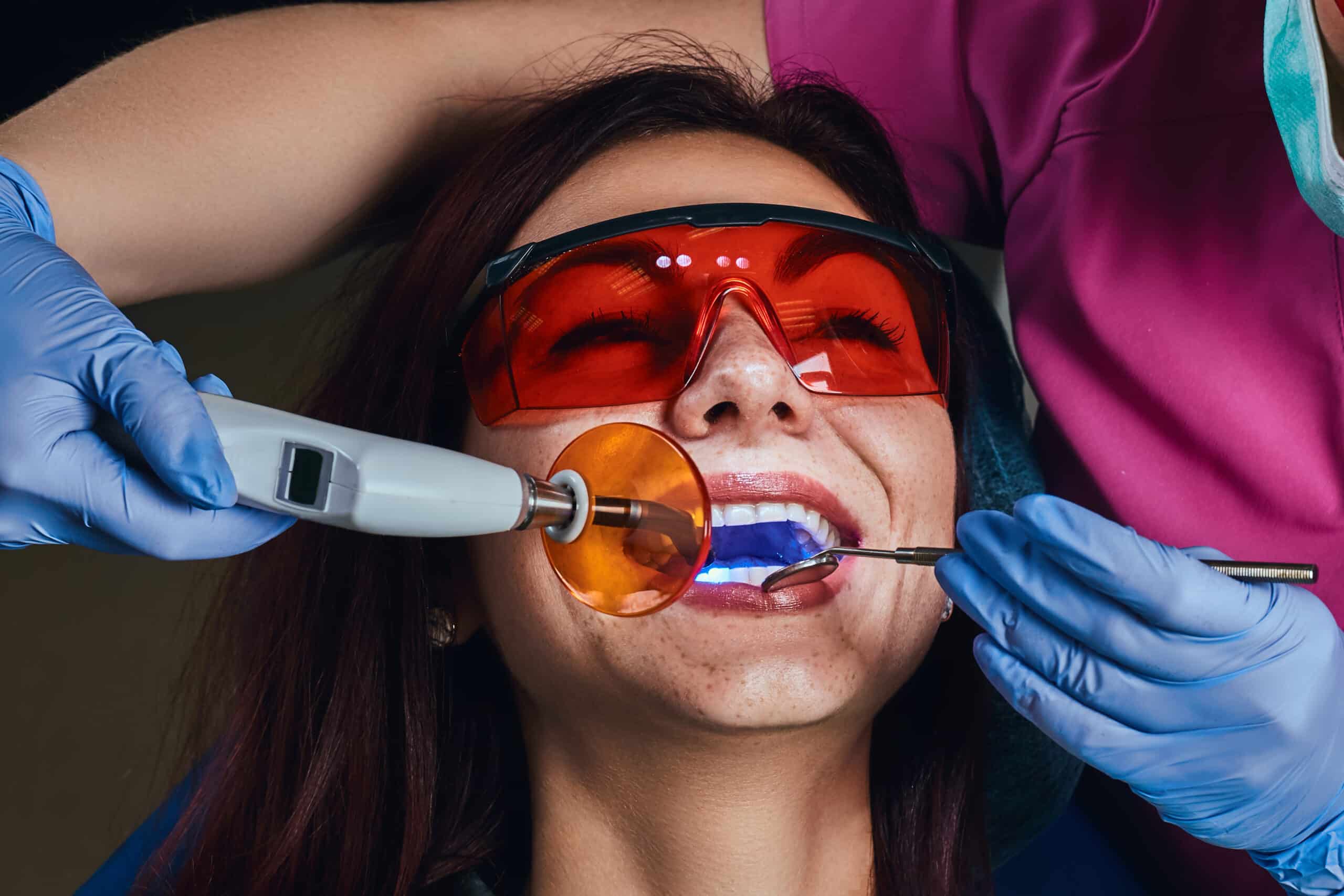Why Are My Teeth Sensitive After Whitening? Causes And Prevention Tips
By :
Affordable Dentist | September 21, 2023
A dazzling white smile is often the epitome of healthy teeth and confidence. It's no wonder that teeth whitening has become immensely popular, with countless individuals seeking to enhance their smiles. While teeth whitening can indeed brighten your teeth, it may come with an unexpected side effect: sensitivity. Many people experience heightened tooth sensitivity after teeth whitening treatments, leaving them wondering, "Why are my teeth sensitive after whitening?" In this comprehensive guide, we'll explore the common causes of post-whitening tooth sensitivity and provide practical prevention tips to ensure your journey to a whiter smile is as comfortable as it is beautiful.
Causes Of Sensitivity After Teeth Whitening
Whitening Gel Ingredients
One of the primary reasons for post-whitening tooth sensitivity lies in the ingredients of the whitening gel used. Most teeth-whitening products contain peroxide-based bleaching agents, such as hydrogen or carbamide peroxide. These chemicals penetrate the enamel to break down stains but can also reach the dentin, the sensitive layer beneath the enamel. When this happens, it can lead to temporary tooth sensitivity. To mitigate this, opt for professional teeth whitening in Dallas, where dentists use customized, lower-concentration whitening gels that minimize sensitivity while delivering excellent results.
Tooth Dehydration
During teeth whitening, the enamel loses moisture, causing dehydration. This dehydration can result in increased tooth sensitivity. To counteract this, it's essential to follow post-whitening care instructions diligently. Dentists often recommend desensitizing toothpaste to rehydrate the enamel and reduce sensitivity. Additionally, maintaining proper oral hydration by drinking water and avoiding excessive consumption of staining beverages like coffee and red wine can help prevent dehydration-related sensitivity.
Overuse of Whitening Products
In pursuing a brighter smile, some individuals may be tempted to overuse whitening products, hoping for quicker results. However, excessive or frequent use of whitening treatments can lead to enamel damage and heightened sensitivity. Following the recommended usage guidelines provided with the whitening product or by your dentist is crucial. Spacing out treatments and using them as directed can help you achieve your desired results without compromising tooth health.
Existing Dental Issues
If you already have underlying dental issues, such as cavities, gum recession, or enamel erosion, these can increase tooth sensitivity after whitening. Before undergoing any teeth whitening procedure, consult with a dentist in Dallas to address and treat any existing dental problems. A healthy dental foundation ensures a smoother and less sensitive whitening experience.
Prevention Tips
While post-whitening tooth sensitivity is common, several proactive steps can be taken to prevent or minimize it. By following these prevention tips, you can ensure that your teeth whitening experience is both effective and comfortable:
Professional Whitening
Opt for professional teeth whitening in Dallas under the guidance of an experienced dentist. Professional-grade whitening products are typically of higher quality and come with customized treatment plans tailored to your specific needs. Dentists can adjust the concentration of the whitening gel to minimize sensitivity while still delivering excellent results.
Consultation and Assessment
Before starting any whitening treatment, schedule a consultation with your dentist. They will assess your oral health, identify any pre-existing dental issues, and address them before proceeding with whitening. Treating conditions like cavities or gum disease beforehand can significantly reduce the risk of sensitivity.
Desensitizing Gel
Many dental professionals offer desensitizing gels that can be applied before or after whitening. These gels contain ingredients that help reduce sensitivity by sealing the tubules in the dentin and blocking nerve pathways. Using a desensitizing gel as part of your whitening treatment can make a substantial difference in your comfort level.
Custom Trays
If you opt for at-home whitening, consider using custom-fitted trays provided by your dentist. These trays ensure that the whitening gel is evenly distributed and does not come into contact with your gums, reducing the risk of irritation and sensitivity. Over-the-counter whitening trays may not fit as well and can allow gel to seep onto sensitive gum tissues.
Lower Whitening Concentration
If you choose at-home whitening, select products with lower peroxide concentrations. While these may require more extended use to achieve desired results, they are gentler on your teeth and less likely to cause sensitivity. Follow the manufacturer's instructions carefully to avoid overuse.
Avoid Over-Whitening
It can be tempting to use whitening products more frequently than recommended, thinking it will speed up the process. However, over-whitening can lead to increased sensitivity and even enamel damage. Stick to the recommended treatment schedule and consult your dentist if you have any concerns about your progress.
Post-Whitening Care
After completing your whitening treatment, continue to follow your dentist's recommendations. Use a desensitizing toothpaste designed for sensitive teeth to maintain and strengthen your enamel. These toothpaste formulations often contain ingredients like potassium nitrate or fluoride, which can help reduce sensitivity and protect your teeth.
Maintain Excellent Oral Hygiene
Good oral hygiene practices are essential both before and after whitening. Brush your teeth gently with a soft-bristle toothbrush and a non-abrasive toothpaste. Floss daily to keep your gums healthy and prevent gum recession, which can contribute to sensitivity. Regular dental check-ups and cleanings can also help monitor your oral health and address any emerging issues.
Teeth whitening can undoubtedly enhance your smile, but it's essential to understand and address the potential for post-whitening tooth sensitivity. By considering the ingredients in whitening products, preventing tooth dehydration, avoiding overuse, and addressing pre-existing dental issues, you can enjoy the benefits of a whiter smile without unnecessary discomfort. Remember, professional teeth whitening in Dallas, under the guidance of an experienced dentist, offers a safer and more comfortable whitening experience. Your journey to a radiant smile should not come at the expense of tooth sensitivity. Prioritize both the aesthetics and the health of your teeth, and you can confidently flaunt your pearly whites for years to come.


